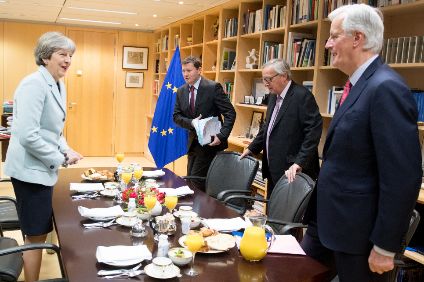
The draft withdrawal agreement drawn up by the UK and the EU to cover how the country departs the bloc could create separate national food regulators for Northern Ireland based in a remaining EU member state.
The agreement, which needs to be approved by politicians on both sides of the Channel, also gives some succour to food companies in the remaining EU member states that export to the UK and enjoy geographical indication protections.

Discover B2B Marketing That Performs
Combine business intelligence and editorial excellence to reach engaged professionals across 36 leading media platforms.
A technical annex to the agreement, which was published yesterday and has already sparked resignations from the UK government, says “national reference laboratories” with responsibility for advising on a wide range of food legislation in Northern Ireland “shall not be read as including the reference laboratory in the United Kingdom”.
It added: “This shall not prevent a national reference laboratory located in a member state of the European Union from fulfilling the functions of a national reference laboratory in respect of Northern Ireland.”
The laws coming under such non-UK laboratories’ controls would be comprehensive. They would include assessments of food safety issues, GMOs, pesticides, animal diseases and eradicating them, the safety of livestock reproductive materials, feed and more.
Northern Ireland goods could be marked as ‘UK(NI)’ or ‘United Kingdom (Northern Ireland)’ under the agreement, when sold in the EU or UK.

US Tariffs are shifting - will you react or anticipate?
Don’t let policy changes catch you off guard. Stay proactive with real-time data and expert analysis.
By GlobalDataThe agreement is, however, silent on whether the UK will remain a member of the European Food Safety Authority (EFSA) from its projected EU exit date of 29 March, and hence able to directly influence its rulings and formal opinions. That could have a significant effect on UK food companies given that, under the draft deal, the UK would be bound to follow EU food legislation at least until the end of a projected transitional period to 31 December 2020.
Meanwhile, food exporters based in the EU will be able to rely on their geographical indication protections within the UK even should Britain quit the bloc, as planned on 29 March.
The draft agreement said such protections would continue to be honoured by UK regulators even if they are new GIs approved during a proposed transition period, when EU law would continue to apply in the UK, until 31 December 2020. These rights would cover a “geographical indication, designation of origin or traditional speciality guaranteed”, says article 54 of the proposed agreement.
As for EU geographical indication rights held by UK companies, there are less detailed provisions but these would be guaranteed until the end of the transitional period to December 2020.
Assuming it survives upcoming votes in the UK Parliament, the agreement would also aid EU and UK food exporters to Britain and the EU by ensuring that the UK and the EU will remain in a customs union until a “future relationship becomes applicable”.
That means the UK will keep its import duties for imports of non-EU goods harmonised with EU rates and certainly no lower. It would also mean duty-free trades with the rest of the EU will be preserved.





